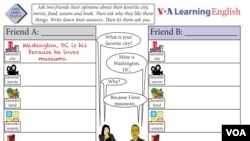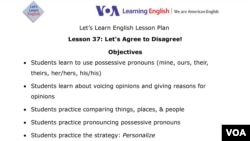Lesson 37: Let's Agree to Disagree
Let’s Learn English เปิดโอกาสการเรียนรู้และฝึกทักษะภาษาอังกฤษ ในรูปแบบที่ถูกออกแบบโดยผู้เชี่ยวชาญตามมาตรฐานการศึกษาของอเมริกา เพื่อให้เนื้อหาเหมาะสำหรับผู้เริ่มเรียนภาษาอังกฤษ
เรานำเสนอ 52 บทเรียน และทุกๆ 5 บทเรียน จะมีการทบทวนสิ่งที่เรียนไปแล้ว
ทุกสัปดาห์จะมีบทเรียนใหม่ พร้อมด้วยวิดีโอ ที่สะท้อนชีวิตชาวอเมริกันรุ่นใหม่ ผู้เรียนจะได้ฝึกการพูด เขียน และจดจำคำศัพท์
นอกจากนั้นผู้เรียนสามารถพิมพ์บทเรียนที่ทำแล้ว ผลการฝึกฝน และแผนการฝึกเรียนภาษาอังกฤษในบทต่อๆ ไปได้
เราอยากให้คุณติดตามบทเรียนใหม่ๆ ทุกสัปดาห์ และบอกให้เรารู้ถึงการเรียนรู้ของคุณผ่านการแสดงความคิดเห็น (comment) และอีเมล์ของเราที่ thai@voanews.com
เรื่องย่อ
ในบทเรียนนี้ แอนนาได้เจอเพื่อนใหม่ ฟิล ซึ่งเพิ่งย้ายเข้ามาอยู่ในกรุงวอชิงตัน และรู้สึกไม่คุ้นเคยกับเมืองสักเท่าไหร่ แอนนาจึงอาสาเป็นคนที่ช่วยทำให้เมืองนี้ดูน่าอยู่สำหรับฟิล
ฝึกพูด
ใช้คลิปวิดีโอนี้ในการเรียนรู้คำศัพท์ใหม่ และการให้เหตุผลเวลาแสดงความเห็น
ฝึกออกเสียง
ในบทเรียนนี้ คุณจะได้เรียนรู้การออกเสียงคำสรรพนามแสดงความเป็นเจ้าของ (possessive pronouns)
บทสนทนา
Anna: You know, I am from the country and sometimes I miss it. But I really like life in the city! I love the city. Oh, look. Someone lost a bag. Maybe it's theirs. Excuse me. Is this bag yours?
ฝึกเขียน
เมืองไหนที่เหมาะแก่การอยู่อาศัยมากที่สุด? เล่าถึงเมืองที่คุณอาศัยอยู่หรือที่คุณต้องการจะอยู่ในตอนนี้? และอย่าล่าให้เหตุผลว่าเมืองนั้นน่าอยู่อย่างไรด้วยการ อีเมลหาเรา หรือเขียนที่ช่องแสดงความเห็นด้านล่าง
คลิกที่ภาพด้านล่าง เพื่อดาวน์โหลด เอกสารประกอบการเรียน และฝึกวิธีการแสดงและแลกเปลี่ยนความคิดเห็น
กลยุทธ์การเรียนรู้แบบลัด
Learning Strategies หรือ กลยุทธ์การเรียนรู้ คือความคิด ความตั้งใจ และการกระทำ ที่ช่วยให้การเรียนง่ายขึ้น หรือมีประสิทธิภาพมากขึ้น
กลยุทธ์การเรียนรู้ของบทเรียนนี้ คือ การทำให้เป็นส่วนตัว (Personalize) หมายถึง การเชื่อมโยงข้อมูลใหม่ที่เกี่ยวข้องกับความรู้สึกหรือประสบการณ์ส่วนตัว เมื่อเรากำลังฟังภาษาอังกฤษ เราจะใส่ความเป็นตัวเองด้วยการคิดถึงสิ่งที่เราได้ยินเหมือนกับสิ่งที่เราเคยเจอมาก่อนทุกครั้งที่เราหัดพูดและหัดเขียนภาษาอังกฤษ ซึ่งสิ่งเหล่านี้จะช่วยในการสื่อสารภาษาอังกฤษได้
อย่างในบทเรียนนี้ แอนนาบอกฟิลว่าทำไมเธอถึงชอบอยู่ในกรุงวอชิงตัน เธอได้ใส่ความเป็นตัวเองลงไปในสิ่งที่เธอชอบในกรุงวอชิงตัน เธอบอกว่า เมืองนี้น่าตื่นเต้น! และมีความหลากหลายด้านวัฒนธรรมมากกว่าประเทศอื่น ที่นี่มีพิพิธภัณฑ์และร้านอาหารมากมาย ทุกๆคืนและมีภาพยนตร์และดนตรี รวมทั้งมีงานให้ทำมากมาย
แล้วคุณเห็นตัวอย่างอื่นอีกหรือไม่ ที่ใช้กลยุทธ์การทำให้เป็นส่วนตัวในการให้เหตุผล? เขียนหาเราที่ช่องแสดงความเห็นด้านล่าง หรือ อีเมลหาเรา
ครูผู้สอน คลิกที่ Lesson Plan เพื่อกลยุทธ์การเรียนการสอนในบทเรียนนี้
แบบทดสอบความเข้าใจด้วยการฟัง
ทดสอบความเข้าใจในบทเรียนนี้ด้วยแบบทดสอบการฟัง คลิกที่วิดีโอนี้ และเลือกคำตอบที่ดีที่สุด
_____________________________________________________________
คำศัพท์ใหม่
agree - v. to have the same opinion
dirty - adj. not clean
disagree - v. to have a different opinion
friendly - adj. acting like a friend or kind and helpful
nature - n. the physical world and everything in it that is not made by people
noisy - adj. making a lot of loud or unpleasant noise
opinion - n. a belief, judgment, or way of thinking about something
peaceful - adj. quiet and calm or without noise
rude - adj. not polite
______________________________________________________________
เอกสารประกอบการเรียน
ดาวน์โหลดเอกสารประกอบการีเรียน VOA Learning English Word Book ซึ่งเป็นเอกสารรวมคำศัพท์ที่ใช้ในเว็บไซต์นี้
ในแต่ละบทเรียนของ Let’s Learn English เรามีชุดฝึกทบทวน Activity Sheet สำหรับการฝึกเพิ่มเติมที่คุณทำได้เอง
ครูผู้สอน
คลิกที่ Lesson Plan ในบทเรียนนี้ เพื่อเป็นแนวทางในการเรียนการสอนในห้องเรียนของคุณ หรือ อีเมลหาเรา หากมีคำถามหรือคำแนะนำในหลักสูตรนี้
ไวยากรณ์ที่ควรใส่ใจ: สรรพนามแสดงความเป็นเจ้าของ หรือ Possessive Pronouns (mine, ours, their, theirs, her/hers, his/his)
หัวข้อหลักในบทเรียนนี้: การแลกเปลี่ยนความคิดเห็น, การเห็นด้วยและไม่เห็นด้วย, การเปรียบเทียบสิ่งต่างๆ, สถานที่และผู้คน
กลยุทธ์การเรียนรู้แบบลัด: การแสดงความเป็นส่วนตัว
การฝึกพูดและการออกเสียงที่ควรใส่ใจ: การให้เหตุผลสนับสนุนความคิดของตัวเอง, การออกเสียงสรรพนามแสดงความเป็นเจ้าของ
____________________________________________________________
ตอนนี้คุณสามารถบอกเราได้ว่าคุณคิดอย่างไรกับบทเรียนนี้ ด้วยการเขียนอีเมลหาเรา หรือแสดงความคิดเห็นมาที่ช่องแสดงความคิดเห็นด้านล่าง หรือส่งมาทางหน้า Facebook




